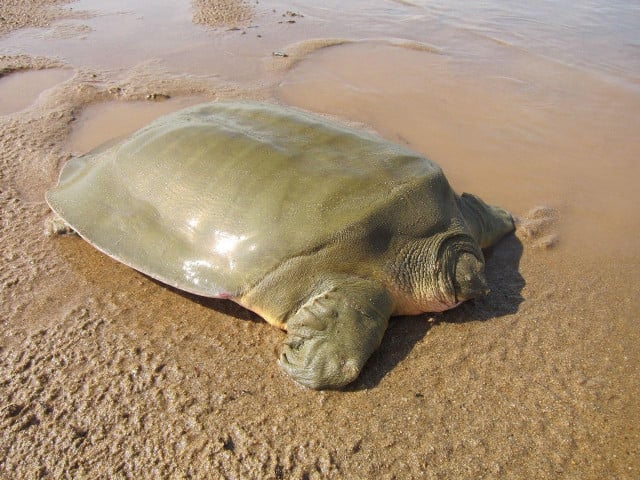Conservationists Discover 49 Nests of Endangered Turtle in 2020

- Jazmyn Himel
- June 7, 2020 6:01 AM
The Cantor softshell turtle nests were discovered by the Wildlife Conservation Society, but challenges remain in keeping the species alive.
PHNOM PENH--To honor World Turtle Day on May 23, the Wildlife Conservation Society (WCS) in Cambodia celebrated the rise in Cantor’s softshell turtle nests in this year’s nesting season.
Although there was an increase of only two more than last year’s nests, this nesting season boasts a discovery of 1,756 eggs, a significantly higher number than previous years, WCS noted in a statement.
A total of 824 baby turtles have hatched so far from 41 nests, with 657 hatchlings being released into the wild as of May 22 and the rest remaining under care for future release.
WCS Communications Manager Leak Ratna confirmed that the number of hatchlings had improved on last year, adding that they will be released at the end of the month.
“The project tries to keep them in care for around three to four weeks to help them grow and reduce mortality when released from natural predators,” she continued.
“Threats still exist in the form of illegal fishing activities, sand dredging, climate change, and future dam developments along the Mekong. The long age to reach maturity of the species is also a threat to them,” she said.
The Mekong River Commission (MRC) agreed, arguing that climate change is a new threat that changes the weather patterns and impacts the season when the species are supposed to lay their eggs.
However, the MRC also noted that dams pose an existential threat to all wildlife biodiversity. From obstructing migration paths and altering habitats and ecosystems, to completely transforming river conditions with reservoirs, dams are leading to the extinction of numerous species.
Likewise, dams often foster exotic species, some of which are known to displace indigenous species and sometimes act as a transmission vector for disease.
Preservation Efforts
The Cantor Giant Softshell Turtle is classified as Critically Endangered on the IUCN Red List of Threatened Species. The species was thought to have vanished from Cambodia by 2003, but in 2017 Conservation International discovered a remnant population along the Mekong, according to the MRC.
The unique turtle species, known as the frog-faced turtle, spends 95 percent of its life submerged in sand or mud, emerging only twice a day to breath. It is known as one of the fastest striking animals in the world and has jaws that can crush bone MRC explained.
After the species rediscovery in 2007, the Cambodian Deparmtnet of Fisheries partnered with nonprofit Conservation international and World Wildlife Fund to create the community-led nest protection program.
A few years later, a Mekong Turtle Conservation Centre was established in Sambor (Kratie) by Conservation International; “it served as a head-start facility for the turtles, with hatchlings gathered from natural nests along the river and kept indoors for 10 months before being released back into the wild,” MRC stated.
This was coupled with turtle guardians—six teams of former poachers who were paid to patrol the river beaches and protect the turtles.
WCS’s conservation efforts for the species have spanned from: expanding nest protection programs to more than 14 community fisheries, expanding law enforcement through community-government joint patrols, livelihood improvements through aquaculture program funding packages, education and outreach programs to schools and villagers and lastly, funding to local NGO partners to combat illegal turtle trade across the country and Mekong source site, according to Ratna.















